Don't Just Suffer - You Can Do Something About Writer's Block! Is writer’s block a real thing? Or is it something that people have invented to account for their lack of progress as a writer? Personally, I have always thought that writer’s block was something that was invented for the script of a stage play or movie as a way of getting a character, who is an author, out from behind their desk and into the world so they could have an adventure. But was I right? As I have a bit of a background in psychology, I went looking for a psychologist who could answer this question. Sadly, there hasn’t been much research done in this area. Most commentators seem to regard writer’s block as a blockage in the creative process and the way to treat it is the same as a plumber would use to unblock a pipe. But there are a couple of bits of research that suggest this approach is wrong. This is one of the research articles I found. This is only the “abstract” for the study, but it does provide the key messages.  Treat it the way a plumber treats a blocked pipe! Treat it the way a plumber treats a blocked pipe! While it concludes that writer’s block is real (yes, I was wrong - who could imagine that?), it doesn’t find that the creative process itself is the cause. The likely causes are much deeper rooted than that. It could be the way sufferers were taught to write, way back when they first started school. It may be caused by external pressures such as deadlines or feelings of being controlled, or feelings of not being in control. It could even be caused by a fear of being criticised. Yes. If you are anxious about what people might think of your writing, it may prevent you from writing in the first place.  Worst case scenario - you might need therapy. Worst case scenario - you might need therapy. So, if you suffer from writer’s block it isn’t about not having a good idea for a plot, or that you can’t develop your characters, or you can’t find the right word to describe the particular sort of rain that is falling. It may be because you had an overly controlled environment when you were first learning to write your name, which has carried forward into adulthood and you now worry about what your 1st grade teacher might think of what you are now putting on paper. So, this is a psychological issue, not a creative one. To treat it, you have to identify the cause and work it out of your system, so it no longer affects your writing. In the worst case scenario it might involve therapy, but for most people it probably just means acknowledging that there is a problem and finding ways round it. Living in the present, rather than the past or the future, is a good first step.  Overly controlled environment when your were learning to write your name Overly controlled environment when your were learning to write your name Looking at social media, I have observed that anxiety about whether someone’s writing is “good enough” is a common theme. In post after post, writers are seeking affirmation that their work is of value and of a good standard. Such reassurances are given but, of course, they are meaningless if the person giving the reassurance hasn’t actually read the work itself. And I think these worried writers know this, which is why the question occurs so often. But what about deadlines and control? They are one of the causes of writer’s block that have been identified. Deadlines are particularly ironic, in that the need to meet a deadline is, potentially, the cause of it not being met. The way around that one is for the writer not to agree to unrealistic deadlines, then for them to manage their time appropriately so they are able to meet the realistic target date. The journey of a thousand miles begins with a single step and it is taking that first step that is the important part of the journey – not the final step. Take control of the process and retain that control throughout.  A lack of feeling of control is a major cause of stress in any environment. It has been cited as the cause for so much stress and as a trigger for depression. People who read or watch a lot of news, for example, are likely to suffer a higher level of stress because they start to worry about events that they are reading about or watching, but which aren’t within their control. Knowing that, I find it unsurprising how some of the exchanges on social media become so toxic. “Pick a side” is now the order of the day, but picking a side is likely to cause stress unless it can directly impact on the issues in question. And no, posting about an issue on social media isn’t activism. If anything, it is passivism because it doesn’t require anyone to actually do anything. If nobody has to do anything then change doesn’t happen so the feelings of lack of control are amplified, creating more stress  "WHY AREN'T YOU LISTENTING TO ME!?" "WHY AREN'T YOU LISTENTING TO ME!?" So, the stress of not being able to change someone’s mind through posting on social media comes out in the toxicity of the posts themselves. Effectively it is people screaming “Why aren’t you listening to me!” into a complete stranger’s face. If you feel stressed after being on social media, it is no surprise and the best thing you can do about it is not go on social media. But then you’ll experience FOMO* and that creates more stress. That is an extreme example, of course, but the same generic symptoms are to be found in writer’s block, with tight feelings in the chest or stomach, feelings of anxiety, insomnia, irritability, panic attacks et al caused by the feeling that the writer isn’t in control of what they are doing. BTW, you don't have to pick a side. No, really, you don't. If people try to force you to pick a side, it is for the benefit of their agenda, not yours.  You have to choose to change. You have to choose to change. But there are things that can be done to deal with that stress and by dealing with the stress, the writers can then focus on what actually matters, which is the creative process. There are a number of blogs on ways of dealing with writer’s block and they all say pretty much the same thing. So, if you’ve already read those, don’t think you’re going to find any greater enlightenment here. But if you’ve read those blogs and you’re still suffering from writer’s block, it means you haven’t heeded the messages and are still trying to find the “silver bullet”. Bad news - there isn’t one. Changing your behaviour is the only way to overcome writer’s block. And if you don’t want to change your behaviour, you’ll have to learn to live with writer’s block and being an unproductive writer. If you always do what you always did, you'll always get what you always got!" (Henry Ford). So, for those of you who want to change your behaviour, what can you do?  Stay off social media Stay off social media Stay off social media when you are trying to write. This may not be what you want to hear, but it may be what you need to hear. First of all, social media is a distraction and when you are trying to achieve anything (not just writing) you don’t need distractions. Secondly, so much that is seen on social media is negative and negativity is a great source of stress, which is the enemy of creativity. If you must have a daily fix of social media, leave it until after you have finished writing for the day. You might even treat it as a reward for a good day's work.  Get some exercise. Not only does exercise reduce stress, it also produces endorphins which make you feel better. They also stimulate mental activity. Aerobic exercise is best, but any exercise is better than none. Do something different. Instead of wrestling with the same problem over and over again, do something else. Another creative activity is good (drawing, music, cooking etc), but it doesn’t have to be. In fact, mundane, repetitious tasks leave the brain free to process other stuff. Those naff colouring books for adults that were all the rage a couple of years ago may actually be the cure for your writer’s block. But you could also try gardening, cleaning the house or washing the car.  Do something different Do something different Change your location. Many writers go to “retreats” or have a cottage in the country where they write, but it doesn’t have to be that grand (or expensive). Just taking your laptop to the coffee shop or the park can be enough of a change to take your mind off the blockage and allow ideas to flow instead. Don’t try to write your book, try to write something else instead. You’ll find thousands of writing prompts on the internet that you can use to stimulate the writing juices. Once you have started writing on an unrelated subject, it becomes much easier for the brain to stay in writing mode and allow you to move smoothly onto your book. You don’t even have to start a fresh page or open a new file. Just keep writing and edit out the irrelevant stuff (which actually got you started) afterwards. Don’t beat yourself up. You are human and suffer human frailties. If you can’t write today, there’s always tomorrow. Simply forgiving yourself is sometimes enough for your brain to say “Thank you. Now, I’ve had some thoughts about the start of chapter 15.”  Just do nothing Just do nothing Do nothing for a while – and I do mean nothing. Yes, staring off into space helps. Your brain will try to fill the gap in conscious activity and it may well fill it by giving you ideas about your plot. It’s far less stressful than pacing up and down worrying over the fact that you can’t come up with an idea. It's why we often have bright ideas while we're asleep or about to fall asleep. Cut yourself off from distractions. If you are stressed by the hubbub around you, it is harder to concentrate on what you should be doing (this applies in any workplace). If you can’t get the people out of the house, get yourself out instead. Libraries are nice quiet places to work, so take your laptop or tablet and visit yours. Change your habits. If you are struggling to write in the morning, switch to the afternoon, or the evening and vice versa. The time of day you work best is affected by your circadian rhythms so if your working times are out of synch with your “body clock” you are going to be less productive and less creative. This is hard if you have a “day job” as well as being a writer, but it may be necessary. It’s why some authors become successful only after they take the big gamble and quit their day job. (Just to be clear, we ARE NOT recommending you quit your day job) 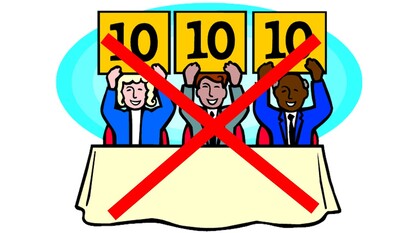 Your book doesn't have to be perfect at the first attempt. Your book doesn't have to be perfect at the first attempt. Don’t try to “binge” write. Stop writing at a point that is natural, such as the end of a paragraph, scene or chapter, rather than setting a finish time or a word count target. You’ll feel less pressure, which will allow your mind to do what you want it to and be creative. Conversely, if you are “in the zone” and the words are flowing, by all means keep going. But when you feel you need to stop, just stop. Don’t try to get the book perfect at the first attempt. Perfection comes later, once you have got the first draft written. This is another reason for not accepting deadlines. If you know you haven’t got time to do an edit later, you’re going to be too stressed to get the first draft written. Making progress on something that isn’t perfect is better than trying for perfection and not getting a single word written. So, there you have it. Writer’s block is real, but you don’t have to suffer from it. Doing something to overcome it is a choice, as is deciding not to do anything about it. But if you choose the latter course of (in)action, on your own head be it. * FOMO – Fear of missing out. The fear that while you’re not on social media you might miss the latest photo of Kim Kardashian (or whoever your favourite celebrity or “influencer” happens to be), or you may miss a meme of a cat playing the piano, or … well, you get the idea. If you have found this blog helpful and/or informative and you don't want to miss future posts, the easy way is to sign up for our newsletter. Join our thousands of subscribers and we promise not to spam you and you can stop subscribing at any time.
0 Comments
All book reviews posted on the Selfishgenie Publishing blog page are the opinions of the reviewers, not those of the Selfishgenie management. The Secret Of My Success Is ...... Reading This Book 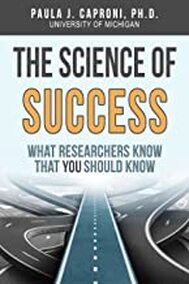 I’m not a great one for “self-improvement” books. Firstly, the only thing they really seem to improve is the author’s bank balance and, secondly, if they have changed someone’s life then there is a strong contextual element behind that change which means it's unique to that person. If the context is unique to an individual then what is advocated may not work for anyone else, so why buy a self-improvement book if it’s not going to work for me? However, “The Science of Success: What Researchers Know That You Should Know”, by Paula J Caproni Ph.D is different. Just to establish Dr Caproni’s credentials, she is a Professor of Business Studies in the Management and Organizations Department at the Ross School of Business at the University of Michigan. In academic terms, she is no lightweight because the University of Michigan is in the top 2% of universities in the world. What is different about this book is that it is based on decades of research by psychologists into how successful people behave that makes them more successful than others. It identifies the behaviours they have in common, which means that they aren’t unique or constrained by a particular set of circumstances. What is even more important is that these behaviours can, by and large, be learnt and applied by anyone. OK, if I don’t normally read books like this, how come I stumbled across it? You can blame Covid-19 for that. Because of the restrictions on movement placed on us by our government’s attempts to deal with the pandemic, I was filling some of my time doing a lot of on-line learning. Having just finished one short course I was looking for my next and I stumbled across this course, which bears the same title as the book. I signed up for the course and studied week one, at the end of which I was informed that there was some optional reading and it was this book. It wasn’t expensive (£3.78 on Kindle) so I bought it. "these behaviours can, by and large, be learnt "  As it turns out, if I’d just read the book I didn’t need to do the course as well, because the course is really just Dr Caproni telling the student the same stuff as is in the book. But I didn’t know that until I signed up for the course and what I start I try to finish. Which, it turns out, is an important behaviour when it comes to success. In reading the book I realised that I already did some of the things discussed – life-long learning is another one of the behaviours of the successful and my Covid inspired learning is part of that. That probably accounts, in part, for some of the success I have had in my life. I also realised that I had, at times, sabotaged my own endeavours by behaving in ways that got in the way of achieving success. Looking back over my life that also accounted for a lot. But this is a book review, not a confessional, so I won’t go into that. A common phrase often heard these days is “Change one thing!”. The good news is that, using this book, you can change one thing and see how it works out. You don’t have to swallow the whole book, you can make changes incrementally and see how they affect your life before you change something else. "Which, it turns out, is an important behaviour when it comes to success."  Besides, if you try to change everything at the same time you will probably overload yourself and that is going to hinder more than it will help. If that sounds like a long road to travel, you are right. It turns out that the ability to delay gratification (a dying personality trait in this world of instant gratification) is another behaviour that promotes success. So, if you don’t want to take the long road, you may be doomed to be less than successful. But the good news is that we are also encouraged to give something up, or modify the way we do it, in order to make time for us to do the new things we want to do. For example, if you decide you want to take more exercise, you might need to sacrifice some of your reading time in order to accommodate it. But that doesn’t mean giving up books, because you can listen to an audio book while exercising. Time management of that sort features quite heavily in some sections of the book. The very first thing Dr Caproni advises is to identify what success actually means for you (or, in this case, me). It may mean becoming a multi-billionaire, but it doesn’t have to. However you define success it has to be what you want and what you value, not what someone wants for you (or from you). So, some people will define it as being a multi-billionaire, but others may just define it as having a more satisfying job, being a valued member of a team, getting a promotion at work or having a happy family life. It doesn’t matter how anyone else measures success, it is how you measure it that’s important. "It doesn’t matter how anyone else measures success, it is how you measure it that’s important." In six chapters Dr Caproni takes us through the research into four different areas of behaviour that mark out successful people and how we, the reader, can learn those behaviours for ourselves and apply them in our lives.  Yes, there is a practical element to this. Reading about the research won’t change a thing for anyone. Only by making changes to our lives will we become more successful. To use a phrase I learned many years ago “If you always do what you always did, you’ll always get what you always got!” (Henry Ford) Or, to misquote Albert Einstein (who probably didn’t say it anyway) “Insanity is doing the same thing over and over and expecting a different outcome each time.” Within the book Ch 1 is a general introduction; Ch 2 deals with mindsets and how focusing only on results can constrain our lives; Ch 3 is about being or becoming an expert; Ch 4 focuses on motivation (yes, you do have to be motivated); Ch 5 is about the importance of relationships and Ch 6 is about creating an action plan to move yourself in the direction you wish to travel. “If you always do what you always did, you’ll always get what you always got!” (Henry Ford) Dr Caproni draws on real world examples of people who have made great strides in being successful. Some of the names will be familiar, some less so and at least one, a Chinese child, you will probably never have heard of. But each example used, demonstrates a different aspect of the behaviours that Dr Caproni is teaching. No promises are made of overnight success or achieving great wealth. It isn’t that sort of book. But within its pages are things that everyone (and I do mean everyone) can learn that will make them more successful and, importantly, happier people.  Because happiness and success usually go hand in hand; or so Dr Caproni tells us. Before you say that there are many successful people that aren’t happy, I have to both agree with you and disagree with you. Because you don’t know how those people measure success. They may never be happy because they define success as being the richest, the prettiest, the greatest (whatever) or something else. Which means they will never be happy if they aren’t that thing. Because there can only ever be one of those things with “est” at the end of the word. There can only be one richest person, one greatest athlete, one best actor etc and if that is your goal then you aren’t going to be happy if you fail to achieve it. But for those whose success is measured without being one of those things, then happiness is more likely. Again, Dr Caproni tells us why that should be and, generally, it has nothing to do with the size of your bank balance or being numero uno in whatever field you are in. "Because happiness and success usually go hand in hand" Considering that this book is based on psychological research, it is very easy to read. Dr Caproni has chosen her language with the lay reader in mind. There isn’t much in the way of jargon but, occasionally, Dr Caproni does rather labour a point; however, that is a very minor criticism. And, if you don’t want to buy the book, you can still sign up for the course for free and learn the lessons that way. It is presented entirely as video sessions, which some people might prefer. I have no hesitation about recommending “The Science of Success: What Researchers Know That You Should Know”, by Paula J Caproni Ph.D, to anyone who wants to make more of their life. To find out more about the book, click on the book’s cover image at the beginning of this blog. To read more book reviews like this, sign up for our newsletter so you never miss one. Just click on the button below. Character or Plot? It is a consistent debate in writing, whether plot comes before character or character comes before the plot. In truth, both have their part to play, but if you are going to invest a lot of time, where should you invest it in the first instance – on developing the plot or on developing the character(s)? I’m not here to try to persuade you to our way of thinking (which I’ll elaborate on in a moment). I’m just going to lay out why we think the way we do. If, after reading what we have to say, you still take the other view, that’s fine. It’s your book, you have the right to write it whichever way you want. But we are firmly of the opinion that characters have to come before the plot. We are so convinced of it that we use an equation to express it: Character + Conflict = Plot. In other words, if you have a good character and you give them a conflict to deal with, they will write the plot for you. That’s not original by the way. You’ll find it used on a number of creative writing courses and in books on the subject.  Do your characters look like this? Do your characters look like this? As publishers we get a lot of manuscripts (MSs) which have characters that are so two dimensional that they can’t be seen from sideways on. In fact, to describe them as two dimensional is to give them one dimension too many. The result is that we can’t bring ourselves to read beyond the first few pages of the MS. Why is that? It’s because we’re human. Humans are social beings (even if we sometimes like some “alone time” with a good book). We relate to other people and we form emotional relationships with them, both good and bad. It should, therefore, come as no surprise to discover that we also want to form emotional relationships with the characters we read about. In fact, for some people, their emotional relationships with characters in books transcend their relationships with real people. That’s something that the best authors of romantic fiction have always understood.  We need to feel some of these when we read! We need to feel some of these when we read! That means we have to believe in characters as people (or aliens or orcs or werewolves, depending on your genre). And that means giving them personalities. Without a personality a character is just words on a page. With a personality they are someone we fall in love with or admire or respect or, sometimes, hate. But those feelings don’t come about by accident. The author has to create the character traits that allow us to engage at the emotional level. Once a reader has become emotionally engaged with a character, it becomes important for the reader to find out what happens to them. No matter how absurd the plot may become (and we’ve read some really crazy ones), the reader must find out whether the characters live or die or find true love or boldly go or whatever they are destined to do. But it is more than that. The reader also wants to know what changes the characters undergo during their journey from the beginning of the book to the end. After all, we all know that life changes us in so many ways as we progress through it, so it is necessary for characters to change as well. There's even a technical name for this: it's called the "character arc".  A character is not just their appearance. A character is not just their appearance. Crafting good characters isn’t easy – but neither is it impossible. What authors have to remember is that they can see the character from the inside out as well as from the outside in. This is important, because it is how the character sees themselves that reveals so much about them. This is called their “internal monologue”. What people see from the outside is called the “external monologue”. It is an important part of the character’s personality as well, as it provides contrasts, but the internal monologue is where the reader really gets to know the character. And we all know about these two monologues already, because we have them ourselves. People say “With me, what you see is what you get.” But they very rarely are. In fact, in our experience, what you see is very rarely what you get. The external monologue is how the world sees us and what we allow the world to see. There is our physical appearance, of course; whether we are tall or short, slim or stout, light haired or dark haired and so on and so forth. But those things are very much the two-dimensional approach to characters. They tell us nothing about the inner person, the things we actually relate to on an emotional level.  Describe this character's external monologue in one word. Describe this character's external monologue in one word. Let’s face it, we’ve all met someone really hot looking and then discovered that there’s not a lot going on inside. We call these people shallow for a reason. What readers want is depth. So, there must be more to the external monologue than physical appearance. There are also the person’s external behaviours: the face they show the world. Are they cheerful or sombre? Are they optimistic or pessimistic? Are they outgoing or shy? Are they confident or underconfident? All of these things can be expressed through behaviour – and a whole lot more than those. Think about the last stranger you met and conversed with for any length of time (thanks to Covid that may now be a bit of a distant memory). Perhaps you met them at work, or at a party or in a pub. You might even have been trapped in an elevator with them. It doesn’t matter. During your conversation with them, you will have formed opinions about them. What was your opinion? What behaviours did they display, or what did they say, that caused you to form that opinion? Some of the things I have listed already may have given you clues, but you may have seen or heard things in the person that you want to add to that list. When describing a character to a reader, those are the sort of things that start to add depth. It gives the reader an idea of how the other characters in the book will see and interact with each other. After all, if you can see these qualities (or lack of them) then the other characters in the book must also be able to see them. If the other characters can’t see them it’s the author’s fault, because they are the one who created the character.  What readers really want is hidden depths. What readers really want is hidden depths. The internal monologue, however, is far more revealing, because it tells us how the character sees themself. That happy, confident person cracking jokes at the party may, actually, be a seething mass of misery and insecurity on the inside. The importance of the internal monologue is that it will determine how the character deals with the conflicts that occur within the plot. If they are brave on the outside but a coward on the inside, they are going to want to run away from the conflict. But their external image means they can’t because that will destroy their reputation. So how do they deal with that? That is, perhaps, an extreme example, but the character will have internal conflicts to deal with on top of the external conflicts you create and that makes the plot far more interesting. Indeed, there are novels that deal with nothing other than the way characters struggle inwardly to relate to the world in which they live. So, our thesis is that interesting characters engage the reader’s attention far more readily than the plot.  Conflict brings characters to life. Conflict brings characters to life. And then we get to the conflict. We’ve already mentioned the character’s potential internal conflict(s), but the plot usually emerges from external conflict(s). Until you have established what that conflict is, you can’t know how the character will deal with it, so you have no plot until you have established your characters and your conflicts. You may be thinking “my plot doesn’t have a conflict because it’s about ….” All we can say is that if you haven’t got conflict, you haven’t got a plot. But you have to understand that conflict comes in many different disguises. There are the big conflicts: good vs evil, right vs wrong, justice vs injustice and so on. There are conflicts of ideas. All political and religious divisions are a conflict of ideas. Then there are the smaller conflicts, such as competition for a promotion at work or sibling rivalry over a parent’s affections. Those are all examples of people in conflict with people.  There are other kinds of conflict. There are other kinds of conflict. But there are also conflicts with circumstances. For example, if a pair of lovers are separated by fate, that is a conflict and their fight to overcome that conflict is how they find their way back to each other. Other conflicts relating to circumstances are stories of survival against the odds, whether it is poverty or an earthquake or a rampaging bear that’s the problem. We have all come across the “by-stander”; the person who can watch a conflict unfolding but doesn’t want to get involved. In a book, that can’t happen, at least not to the main character(s). But they have to have a reason to get involved and that, usually, comes from their personality - which you have created. 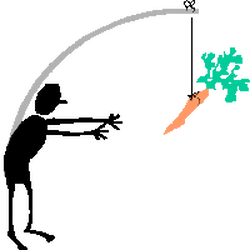 What is your character's motivation? What is your character's motivation? OK, it is some people’s job to get involved, like soldiers in wartime and police in criminal investigations, but in many situations the character(s) need some sort of motivation to get involved. And the character(s) can’t have motivation unless the writer knows what it is. And the writer can only know what the motivation is if they have already constructed the character based on their internal and external monologues. So, for us it is a simple chain of events. Create the character(s) in order to provide motivation, decide what conflict(s) they will have to deal with (both internal and external) and then you have a plot, which can then be developed to its satisfactory conclusion.  If you create the plot first, you have to reverse engineer the character(s) so that they become involved in it. This generally results in a badly drawn character because the author only pays attention to those elements of their personality that require the character to get involved. You need a warrior to complete a quest, so you create a warrior. But the warrior doesn’t have much of a personality, because they are a stereotype, being dropped into the plot like photoshopping in a stock photo from an image library. The Princess (or the Prince) then falls in love with the warrior (and vice versa) because the author wants them to, not because they have identified any unique qualities that the author created. And then the reader doesn’t find that relationship believable because they can’t see the mutual attraction. If you think about real life, we don’t fall in love with a warrior or a Prince or a traffic warden, we fall in love with a person who happens to be one of those things. I didn’t fall in love with my wife because she was a telephonist (archaic term - look it up). I fell in love with her because she was clever, funny, interesting to talk to and a whole lot more. And it is those sorts of qualities, and others, that your readers have to fall in love with. I don’t know whether we have convinced you that character has to come before plot (feel free to comment below), but we have made our case. But if you are an author considering submitting your MS to us, please know that the most likely reason for us to reject your MS is because we don’t find your character(s) interesting enough to engage our attention. We won’t know if your plot is any good because we haven’t read that far through the MS to find out. Sorry. A couple of other things for you now. Firstly, we have a 9 book sci-fi box set of The Magi series available right now, but you can download the first book for free as a "try before you buy" offer. Just click on the button below to get your copy.
Secondly, if you have enjoyed this blog and want to keep in touch with future blog posts, then the easiest way is to sign up for our newsletter. We promise not to spam you. Just click on the "newsletter" button. Can Anyone Become An Author?  After “What do publishers actually do?” (see previous blogs for answers) the question we get asked most frequently is “Can anyone become an author?” That’s actually quite a big question to ask. It’s a bit like “Can anyone run 100 metres?” While the factual answer may be yes (with caveats about physical constraints), we could add that the vast majority of people will never run that distance faster than Usain Bolt; or even half as fast as Usain Bolt. The same applies to being an author. Anyone who can string words together to make an understandable sentence can, theoretically, write a novel. But it doesn’t mean they can write a novel that actually sells enough copies to make it worth the author’s time and effort writing it. For that you need talent. 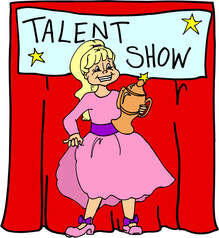 But the good news is that talent can be learned. Did you know that? The “natural talent” that most people are born with will only take them so far. Just because someone has learned to play the violin by the age of 3 doesn’t mean they will ever play the Albert Hall (or Carnegie Hall for my US readers). To be really good at something requires far more. It isn’t going to happen overnight, but if someone has the willpower and the motivation to learn, they can develop the skills necessary to write a book. It might take years of study and practice, but it is achievable. OK, it helps to have some basic skills. A wide vocabulary is an essential. Readers get bored of seeing the same words repeated page after page. They want variety. But a vocabulary is something that can be acquired. All you need to do is learn a new word every day and practice using it in context. That doesn’t sound so hard, does it? "the average person uses only around 20,000 words regularly" 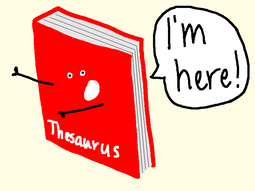 So why do we receive so many submissions that display a very narrow vocabulary? There are 171,146 words in the English language and more are added each year. If you’re an author of historical work there’s are another 47,000 words that are obsolete, but are still available for use. But the average person uses only around 20,000 words regularly. The average 8 year old has a vocabulary of about 10,000 words, so between 8 and adulthood we only learn to use another 10,000 words. Essentially this shows that some authors are in too much of a hurry. They want to tell their story without taking the time to learn the best words to use. But that is self-defeating, because a story that doesn’t grip the reader is one that will never be read. But it’s not just about vocabulary. Children that enter spelling bees have extensive vocabularies, but it doesn’t mean they will ever be good story tellers. It also helps to have a basic grasp of sentence construction and grammar. I'm not going to labour that point too much, because in our view it is better to split an infinitive than to write a clumsy sentence just so you don't have to split an infinitive. But at least learn enough to know that you are splitting an infinitive!  There are many courses available on creative writing. It isn’t our job to advise people which ones to take, because some of them charge fees and we don’t want to steer people into spending money with one organisation rather than another (at least, not without receiving a commission). But we can recommend courses that are free. This one is a good starting point for the would-be author. It’s called Start Writing Fiction and you can sign up for it from anywhere in the world. If you think you have nothing to learn from those sorts of courses, then ask yourself why you are reading this blog in the first place. But what really makes an author, after they have learnt the basics? Practice!  Practice, practice and more practice. And then, when you think you've finished practicing, practice some more. Earlier I mentioned Usain Bolt and his prowess on the running track, but he wasn’t born to greatness. He had some physical advantages, but no more so than many other children. What he did though, was train and train hard; ie, he practiced. No one ever became good at something, be it running, drawing or playing the cello, without practice and the same applies to authors. "And then, when you think you've finished practicing, practice some more." One of the problems with reading great authors is that we see their work at its best. We don’t see the years of practice they have put in to get to that level. The years of attending writing courses, retreats and workshops; the years of scribbling away in corners practicing their skills while everyone else was out having fun. Their book may be in the bookshops, but it didn’t arrive there fully formed at the first attempt. OK, maybe some did, for a lucky few authors, but for the vast majority it is the culmination of years of earlier practice; it may not have been called that, but that is what it was. There are very few authors who have the ability to write the first draft of a book and submit it to a publisher or agent and get it accepted. The authors that do succeed in getting their books published are those that have practiced the art of writing for a considerable period before attempting their first novel.  There are a number of ways that can be done, but we would suggest that you start writing just for the fun of it. Pick a subject and construct a story around it. There are plenty of writing prompts available on the internet to get you started. The next thing to try might be writing the same sentences or paragraphs several different ways – especially experimenting with new vocabulary – and seeing which work the best. You would be surprised how the impact of a paragraph can be changed, for better or worse, with just a few minor alterations. There’s no need to write more than a set number of words. You could start with 100, then 500, move up to 1,000 and then head for the dizzy heights of 10,000. If you can’t write a story that makes it to the 10,000 word mark, then it is unlikely that you will be able to write a full-length novel. But there is a market for short stories, so you could concentrate on that. Just as important as practicing is the quality of the practice itself. 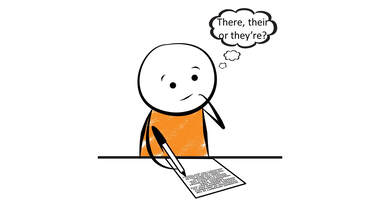 Practicing the stuff that the author finds easy isn’t going to improve their writing. Practicing the stuff that is hard is what brings about improvement. So, if the author hasn’t got an extensive vocabulary, practice allows them to extend it. If they aren’t great at developing believable characters, it is something that can be practiced. Great sports stars don’t spend hours a day practicing the things that come easy to them – they spend hours a day practicing the things that are hard for them. The same applies to any discipline: music, acting, business management, flying aeroplanes – and writing. Research into what creates successful people has demonstrated this time and time again. But practicing by itself doesn’t tell anyone anything. Authors need to know if what they are writing is any good: what is working and what isn’t. That way they can focus their practice on the things that don’t work and build on the things that do. For that they need a network of people who will provide them with honest feedback. "But practicing by itself doesn’t tell anyone anything"  Which is where writers’ groups come in. Most communities have writers’ groups, but you can also join on-line groups. Which is where personality tends to enter the equation. Some people don’t like meeting strangers and some don’t like receiving adverse criticism. I’ll deal with the two things separately. On-line groups help because you don’t actually have to “meet” anyone. But if you can’t discuss writing and put your work forward for discussion, it is unlikely that you will ever get the feedback that tells you where you can improve. And if you don’t get that, you have no way of knowing if your work is good enough for publication. If you are a naturally shy person then it is something you are going to have to overcome if you ever want to develop as a writer. Some people try to work around this by asking their friends and relatives to read their work. Not a good idea. 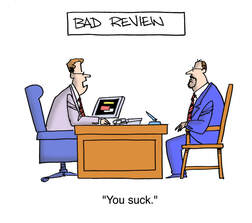 For an author to develop they need a “warts and all” criticism of their work; quality criticism. You are probably not going to get that from friends and family. They love you and they want to help, but their help is usually a hindrance because they will tell you what they think you want to hear, not what you need to hear. You learn the most from your mistakes, not from your successes, but if people won’t tell you about your mistakes, for fear of hurting your feelings, you learn nothing. In short, authors have to seek out the harshest critics. It’s the only way to get the feedback that is the most valuable. It hurts to be told “You suck!”, but it’s better to be told that by someone that you have asked to provide feedback than it is to be told by readers who have paid for your book! Because they certainly won’t pay to read another. Trust us on this. We get flooded with poor quality manuscripts and when we feedback on them, pointing out their flaws, we often get a reply back telling us how the author’s Mum or the author’s partner or the author’s mate down the pub really loved their story, so we must be wrong. If not that, we get very defensive responses trying to explain why the author did things their way. Fair enough – it’s your book, but don’t expect us to agree with you – or your Mum. If you are the sort of person who doesn’t like criticism (and there are many) then it is probable that you won’t be able to work with a publisher anyway. Because it is the publisher’s job to tell you if your book is any good or not, because they can only make money out of good books and every time they publish a book, they are laying their reputation on the line. The publisher will assign an editor to work with the author to get the book ready for publication and if the editor can’t provide critical feedback to the author, the book will never see the light of day.  J K Rowling - allegedly rejected by 12 publishers. J K Rowling - allegedly rejected by 12 publishers. Having a publishing contract doesn’t guarantee an author will be published (did you know that?). Because the terms of the contract will stipulate that the publisher has the final say on whether or not the book is good enough for publication. Which requires the author to accept criticism and make changes if the editor suggests them. I use the verb “suggest” because “tell” sounds a bit blunt, but that’s what the editor is really doing. OK, publishers aren’t perfect and they may not get it right all the time. 12 publishers are rumoured to have turned down Harry Potter before Bloomsbury signed J K Rowling – so those 12 got it wrong. But all publishers know the difference between a stinker and a good book and, sadly, we see too many stinkers. And that’s because so many authors don’t realise that writing a decent story is actually much harder than it looks and it takes years of practice to succeed. Which is a shame because, in most cases, the author could have produced better work if only they had taken the time to learn how to do it properly and then practiced what they learnt. So, consider this: Your book isn’t selling and those few copies that do sell aren’t getting good reviews. Is it the fault of the reader, or the fault of the author? If you think it is the fault of the reader, then it is time to re-think your life choices, particularly the ones relating to being an author. Yes, anyone can become an author, but the successful ones take the time to learn how to be a good author, because no one is going to read a bad author. If you found this blog interesting and/or helpful and you want to make sure you don't miss the next edition, just sign up for our newsletter by clicking the button below. Is Being "Clever" Enough To Ensure Success?  Do you struggle to achieve success in your chosen field? Some people do. Despite being “clever” in academic terms and passing lots of exams, some people find that this doesn’t translate into success in the workplace – or in other aspects of their lives. There has been a huge amount of research carried out on what makes some people successful and why some people, who you might think should be successful, just aren’t. These can be the people who did very well at school, passing exams and earning plaudits. But when they get into the workplace their trajectory slows down and, sometimes, stalls completely. While others, who didn’t do so well academically, move their careers forward over time, leading to observers sometimes saying “Wow, I never expected him/her to rise that high!”. Of course, some “clever” people do become very successful, but others don’t. Just an aside, Britain’s most famous Prime Minister, Winston Churchill, didn’t do too well at school and his teachers didn’t think he would ever amount to much, compared to his peers. “Wow, I never expected him/her to rise that high!”  There are many reasons why some people are successful and others aren’t and they have little to do with intelligence. Hard work plays a part, as does seeing opportunities when they present themselves - what we might call “luck”. But one of the main reasons is the way we see the difference between nature (what we are born with) and nurture (what we experience during our lives). Consider these questions. There are no right or wrong answers but choose between A or B for each one.
If you chose more A answers, it is probable you have what is called a “fixed” mindset (nature). If you chose more B answers, you probably have what is called a “growth” mindset (nurture). 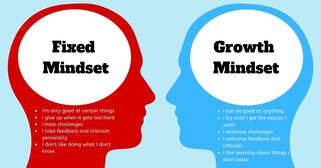 A fixed mindset tells people that they are good at what they are good at and shouldn’t try to do things they aren’t good at. A growth mindset tells people that they can develop existing skills and also learn new skills, which means that they can become more skilful over time. Does this matter? Actually, when it comes to success, it does, What has this to do with publishing? We’ll tell you that at the end of the blog. So, please, stick with us. People with growth mindsets tend to be more successful in life than those who have fixed mindsets. This has less to do with “intelligence” and more to do with a willingness to learn. There are several reasons why this should be. "People with fixed mindsets put artificial boundaries around themselves"  As the 17th century poet, Richard Lovelace, wrote "Stone walls do not a prison make, Nor iron bars a cage". People with fixed mindsets put artificial boundaries around themselves. For example, one of the classic expressions we hear is “I’m a people person.” In other words, “I’m not going to get involved with anything technical.” People may see themselves as good at one particular thing, or a narrow range of things, but nothing else. We might call this their “comfort zone” and they are reluctant to step out of it. But people with a growth mindset don’t impose those sorts of boundaries on themselves, so they are more likely to invest in their own learning, which allows them to develop new skills which they can use at work - and in life. This allows them to take on work which people with a fixed mindset will avoid. People with a fixed mindset will learn, but they usually focus their learning on subjects they know they are good at, eg someone good at maths will study more maths rather than branch out and try to learn about psychology.  People with growth mindsets are more likely to engage in the coaching and mentoring of their teams, which means that their teams perform better, which benefits the company. The coach then gets the credit for developing their staff – they become recognised as a leader. People with fixed mindsets, on the other hand, will restrict people’s development activities to those necessary for their core duties, which means their team doesn’t develop new skills. The team becomes less flexible and less adaptable to sudden changes in circumstances. That can result in the “leader” being seen as the problem, which in turns leads to their career stalling. The fixed mindset leads people to take on work that is easy to do, which they can be sure of completing and earning easy praise. People with growth mindsets aren’t so afraid to take on challenging tasks, because they know they will learn from them. They will take the praise if it’s offered, but they are more interested in the challenge. "People with growth mindsets are more likely to seek out negative feedback" People with growth mindsets are more likely to take risks at work. This means that they rise to challenges that people with fixed mindsets will avoid. Again, it brings them to the attention of their managers, but that isn’t why they do it. Risky projects are more likely to present learning opportunities, which is beneficial to personal growth. And, hand in hand with risk, goes reward.  People with growth mindsets are more likely to seek out negative feedback than people with fixed mindsets. Negative feedback allows the individual to identify their weaknesses and work on them. Just attending to positive feedback doesn’t teach anybody anything. It’s why candidates attending job interviews are often asked about their weaknesses; it reveals the candidate’s attitude to personal growth. Fixed and growth mindsets tend to be established early in life. Children who are constantly praised for their results want more praise, so they focus on the things they are good at, where they can be sure of producing good results. But children who are praised for their effort rather than for their results, are more likely to develop growth mindsets. They know they will be praised for trying, even if they don’t always succeed, so they are more likely to keep trying. This encourages a risk-taking mentality and risk taking usually results in personal growth, one way or another. Unfortunately, teachers and parents are often results focused, rather than effort focused  This behaviour has been demonstrated in numerous research projects where those praised for trying, rather than for results, have tended to make the biggest improvements in their performance over time. It’s as though trying drives achievement, whereas consistent easy results drive complacency. If you are a parent reading this, don’t let me put you off praising your children for getting good results. But make sure that they know it was the effort that they put in that got them the results, not some innate and fixed “intelligence”. It is better to replace the words “clever” or “smart” with “hard worker”. And if their results weren’t quite as good as you had hoped, make sure you praise the child for their effort anyway and play down the actual results so they don’t become afraid of making mistakes. 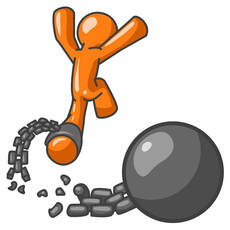 It should come as no surprise that the world’s most successful companies are the ones that focus highly on staff development and learning. It is the key to innovation and innovation is the key to the future success of companies. But people with fixed mindsets don’t invest much in development and learning because they don’t think they need to, because they have always been told they are “clever”. The good news is that if people set their minds to it, they can change these early mindsets by making a conscious effort. Having a fixed mindset isn’t fixed for life! But it does need people to open their minds up to the possibility that they aren’t quite as “clever” as they have always been told – regardless of what it says on their diplomas. "Having a fixed mindset isn’t fixed for life!" If you have read this far you probably have a growth mindset and we could have predicted that you would stick around. The growth mindset in your make-up would have wanted to learn everything you could from this blog. Those with fixed mindsets stopped reading far earlier, shuffling off muttering about “psychobabble” and returning to do something easy which will earn them quick praise.  Earlier in the blog we asked “What has this to do with publishing? Now it’s time to answer that question. The answer is that the best authors aren’t the ones who do only what they are good at. They are the ones who take risks and learn from their mistakes. An author with a growth mindset will hunt down the toughest critics to be their beta readers, because it is those critics who will provide the most valuable feedback. Authors who rely on friendly beta readers or, worse, relatives to be their beta readers are displaying fixed mindsets, because those critics will provide the most positive feedback. But it doesn’t stop there. If an author has had their manuscript (MS) rejected by agents or publishers several times but hasn’t sat down and examined the MS and asked themselves what those rejections mean, they are displaying a fixed mindset. If their friendly beta readers have given them only positive feedback, then it must be the agent/publisher who is wrong for not appreciating their masterpiece. 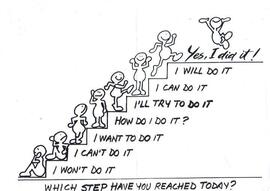 The authors with the growth mindset will be treating each rejection as a learning opportunity and will be trying to find ways of re-writing their MS to make it more appealing to agents and publishers. Guess which type of author is more likely to end up with a publishing contract! Here at Selfishgenie Publishing, we don’t just reject an MS without any explanation. We provide feedback on why the MS didn’t appeal to us. In short, we become a highly critical beta reader. That feedback may not be welcomed by the author, in which case they will continue to receive rejections. But for those authors who recognise the value of the feedback, it is their opportunity to improve their MS and enhance their skills as an author. It is a step on the pathway to success. You’re welcome. But, of course, it also benefits us because next time the MS is submitted it will have been improved upon. OK, sometimes the improvement is so great that the author is snapped up by a larger publisher, but that’s a risk we are willing to take. If you have enjoyed this blog and want to be sure not to miss any future editions, just click the button below to sign up for our newsletter. We promise not to spam you. And, just a hint, if you have a growth mindset you are going to want to find out more. |
AuthorThis blog is compiled and curated by the Selfishgenie publishing team. Archives
June 2025
|
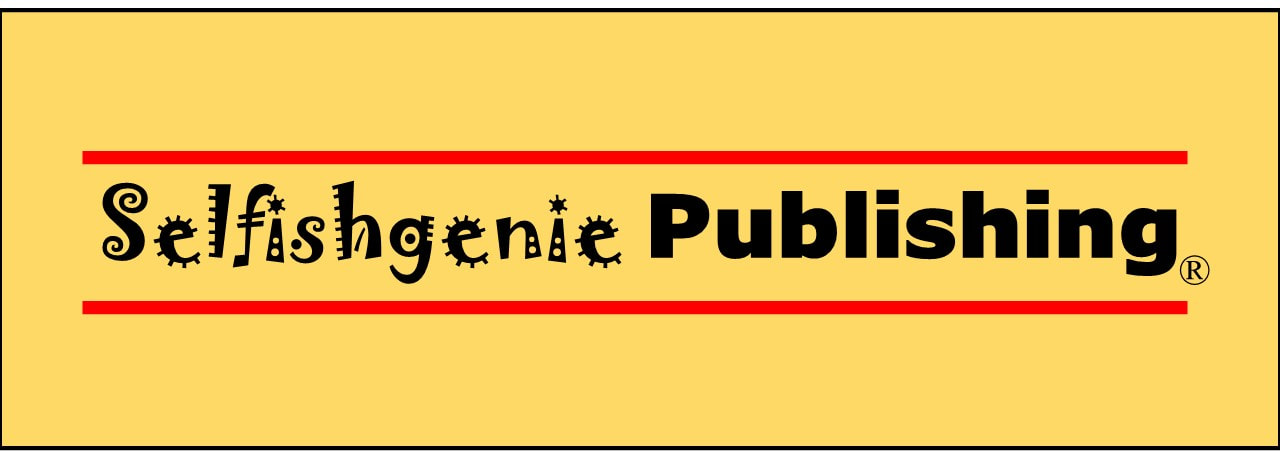

 RSS Feed
RSS Feed